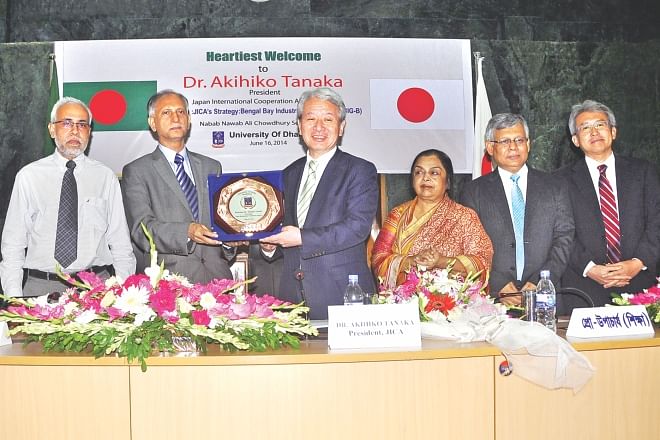Jica chief calls for diversity of energy sources
Jica chief calls for diversity of energy sources

Bangladesh should focus on diversifying the energy mix, creating sufficient jobs and ensuring sound and credible governance in bids to achieve higher economic growth, the Japan International Cooperation Agency chief said yesterday.
“It is time to diversify energy resources as natural gas is depleting in Bangladesh,” said Akihiko Tanaka, president of Jica. He emphasised imports of liquefied natural gas as an alternative energy source.
Tanaka, who is on a four-day visit to Bangladesh, is upbeat on the concept of the Bay of Bengal Industrial Growth Belt (BIG-B), proposed by Japanese Prime Minister Shinzo Abe recently.
Fulfilling the demand for employment is a critical challenge for the country, Tanaka said in a lecture on 'BIG-B towards growth beyond borders' organised by Dhaka University in the capital.
BIG-B is a grand design to promote industrial agglomeration along the Dhaka-Chittagong-Cox's Bazar belt.
“The centre of economic gravity is now shifting from the US and Europe to the Indo-Pacific region. So it is high time for such initiatives as Bangladesh is next to the Indo-Pacific region.”
As per the BIG-B strategy, Japan will provide economic assistance worth $5.9 billion to Bangladesh over the next four to five years to help the country realise its huge economic potential and expedite growth.
Jica is committed to implementing the BIG-B strategy in the country, which has three main pillars, said Tanaka, who joined Jica as its president in April 2012.
The first pillar -- industry and trade -- mainly consists of constructing the long-awaited deep-sea port on Matarbari Island; this will offer Bangladesh an important trade gateway to the rest of Asia and beyond, he said.
The second pillar is energy. Matarbari Island can be developed into a massive supply base of primary energy such as coal, LNG, and oil. The electricity produced from those sources can support a quantum leap in industry and trade, he added.
Transportation is the third pillar. To enable greater industry, trade and energy production, the Dhaka-Chittagong-Cox's Bazar transport artery needs to be strengthened and even extended to neighbouring countries, he said. Tanaka, also a former vice president of University of Tokyo, said Prime Minister Sheikh Hasina's recent visit to Japan has taken relations between the two countries to a new level.
He also called upon the Bangladesh government to join the Association of Southeast Asian Nations to boost economic ties between the Southeast Asian countries.
Abul Barkat, director of the Japan Study Centre at DU, said the BIG-B initiative will help the two countries achieve inclusive economic growth as Japanese entrepreneurs will have the opportunity to invest in the country. The initiative will also help the country build a logistic hub for the region and promote trade between Japan and Bangladesh, he said.
BIG-B is needed for post-garment industrial revolution, said Prof Md Kawser Ahmed, chairman of the oceanography department at DU.
“Connectivity is most important for a supply chain network. Bangladesh will be benefited immensely if it can implement the BIG-B project due to its competitive labour and strategic location.”
The trade balance between the two countries is heavily tilted toward Japan, as Bangladesh imports vehicles, electronic goods and spare parts. On the other hand, Bangladesh exports apparel items, leather and leather goods, and footwear to Japan.
In fiscal 2012-13, Bangladesh exported goods worth $750.27 million to Japan, against $600.52 million in the previous year, according to data from Export Promotion Bureau.
In 2012-13, Bangladesh imported goods worth $1.19 billion from Japan against $1.45 billion in the previous year, according to Bangladesh Bank. Professor AAMS Arefin Siddique, vice-chancellor of Dhaka University, presided over the function.